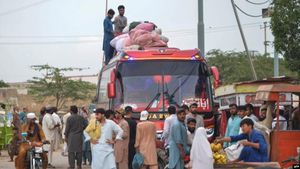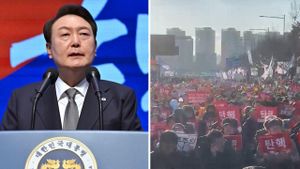Germany is gearing up for one of its most anticipated political events as the federal election approaches. An exciting twist has emerged: four prominent candidates will face off in what RTL has dubbed the "Quadrell" on February 16, 2025. This significant debate will feature current Chancellor Olaf Scholz from the Social Democratic Party (SPD), Union candidate Friedrich Merz, and their challengers Alice Weidel from the Alternative for Germany (AfD) and Robert Habeck from the Greens.
Originally, RTL had planned for only Scholz and Merz to debate, but following public outcries and pressure from political figures, the broadcasting company decided to expand the debate format. This change acknowledges the shifting dynamics within German politics, as well as the need to engage more candidates whose parties are performing well according to recent polls.
According to RTL's politics chief Nikolas Blome, "Quadrell" is set to air at the prime time of 8:15 PM, marking it as pivotal viewing leading up the election scheduled for February 23. The debate will be moderated by news anchor Pinar Atalay and renowned host Günther Jauch, known for his riveting quiz show, “Who Wants to Be a Millionaire?” This new format seeks to capture the interest of voters by providing them with insights from candidates who represent some of the strongest parties currently leading the polls.
Before the “Quadrell,” RTL plans to give voice to other candidates on February 9. There will be appearances by Sahra Wagenknecht from the BSW, Christian Lindner from the FDP, and Gregor Gysi representing Die Linke. This setup intends to give voters a comprehensive view of the diverse political options leading up to the election.
Criticism of debate formats has been rampant. For decades, the one-on-one debate has been the norm, often resulting in unproductive exchanges limiting the flow of ideas and discussion. The previous election, for example, featured “Triells” involving Scholz, Armin Laschet (CDU), and Annalena Baerbock (Greens). Many have argued this practice should be revised—a sentiment echoed by critics from various political parties—who find this approach constraining and not reflective of the contemporary political environment.
Despite the outcry, public broadcasters ARD and ZDF are staunchly defending their decision to maintain traditional debate formats. They plan to air their own debate featuring Merz and Scholz as well as other engagement opportunities with multiple candidates before the election. For example, on February 18, ARD will combine public discourse with candidate check-ins, providing citizens with the chance to engage directly with their future leaders.
The backdrop of debates isn't merely political—it's also deeply personal with significant public interest. Critics have noted morale issues surrounding parties and candidates alike—the recent political strife and debates over policy making have led to increased tension and public scrutiny. The atmosphere has changed, with voters expecting more transparency and variety during the election season.
One of the questions weighing heavily on the minds of many voters is how these candidates plan to address pertinent issues like the state of Germany’s economy, environment, and social policy. By including four candidates, RTL hopes to facilitate discussions covering these vast topics rather than restricting the conversation to just one or two viewpoints.
Overall, the "Quadrell" promises to be illuminating and perhaps even transformative for its participants and the German public. Voters will be watching closely, not only for what is said but for how these candidates interact with one another at such high stakes. Could the dynamics of this debate format influence electoral outcomes? Only time will tell, but initial reactions suggest optimism for more engaging political dialogue this election year.
With electoral participation being critically important, the inclusion of diverse voices during these debates might lead to renewed public interest and engagement. The outcome of these discussions may shape the direction of Germany's future for years to come.



